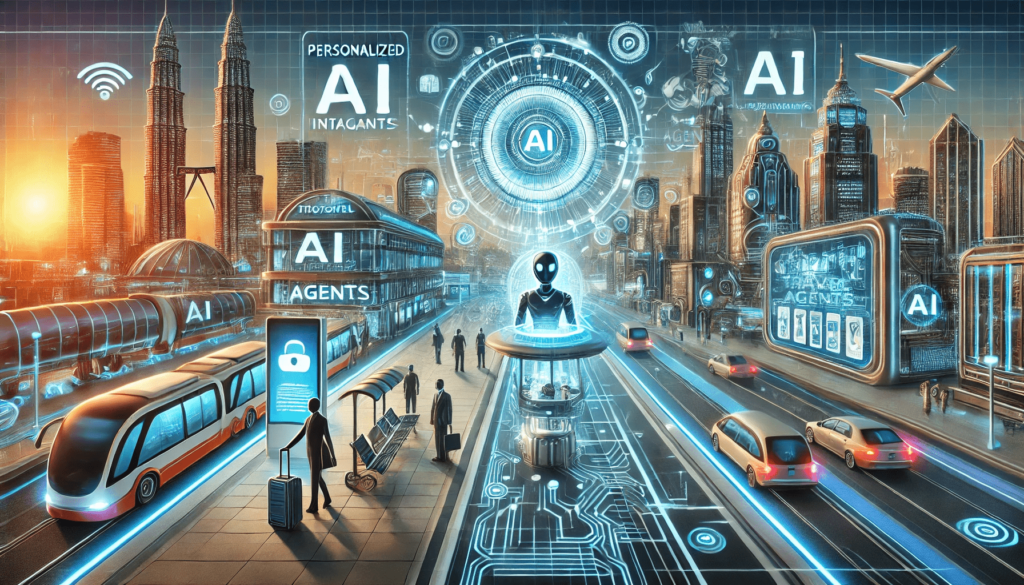AI Revolutionizes Travel: Hyper-Personalization, Efficiency, and Ethical Challenges

An illustration showcasing the future of travel, where AI seamlessly integrates into every aspect of the journey, offering hyper-personalized experiences and efficient solutions.
- How is AI revolutionizing the travel industry by offering hyper-personalized travel experiences?
- What are the potential challenges and ethical considerations associated with integrating AI into the travel sector?
- How will the balance between AI-driven automation and human-centric service shape the future of travel?
Artificial intelligence (AI) is no longer a futuristic concept but a transformative force reshaping industries across the globe. As Forbes reports, the travel industry stands out as one of the most deeply impacted sectors. From the initial spark of inspiration to the moment travelers return home, AI is redefining every step of the journey. As we delve into the implications and possible future scenarios, it becomes clear that while AI promises unparalleled personalization and efficiency, it also raises critical questions about ethics, data security, and the human touch in travel.
The Rise of AI in Travel
The integration of AI into the travel industry is not just about convenience; it’s about creating a seamless, hyper-personalized experience for every traveler. AI-driven recommendation engines, such as those used by Google Travel and TripAdvisor, are at the forefront of this transformation. These platforms leverage machine learning to curate itineraries tailored to individual preferences, analyzing vast amounts of data to deliver suggestions that resonate with each user’s unique tastes and needs.
Startups like Bigfoot’s Lightfoot chatbot AI are pushing the boundaries even further by incorporating natural language processing. This allows for more intuitive interactions, where users can communicate their desires as if speaking to a human travel agent, receiving customized recommendations that feel more like personal advice than algorithmic output.
However, the application of AI in travel extends beyond customer-facing tools. Predictive analytics powered by AI is revolutionizing pricing strategies, enabling companies like Hopper to forecast flight prices with remarkable accuracy. This technology allows airlines and hotels to dynamically adjust their pricing based on real-time demand, optimizing revenue while offering travelers the best possible deals.
Operational Efficiency Meets Sustainability
AI’s impact on the travel industry is not limited to customer experience; it is also driving significant operational improvements. One of the most notable examples is Google’s DeepMind, which is helping airlines optimize flight paths to reduce contrails, a major contributor to aviation’s greenhouse gas emissions. This AI-driven approach to environmental responsibility is becoming increasingly important as the demand for sustainable tourism grows.
Moreover, AI is enhancing operational efficiency in other areas, such as baggage handling. AI-powered image recognition systems are streamlining the process, reducing the chances of lost luggage and improving the overall travel experience. This intersection of technology and sustainability is a key trend that is likely to shape the future of travel.
The Human Element: A Delicate Balance
Despite the remarkable advancements AI brings to the travel industry, the importance of human interaction remains undeniable. While AI can handle complex travel requests and optimize itineraries, there are situations where the human touch is irreplaceable. For instance, in cases of travel disruptions or customer service issues, human agents play a crucial role in resolving problems that AI might not be equipped to handle.
A recent personal experience underscores this point. While AI accurately tracked a lost stroller during a trip to Athens, it was human intervention that ultimately resolved the issue. This highlights the complementary nature of AI and human expertise, suggesting that the future of travel will involve a synergistic relationship between the two.
As AI continues to evolve, new roles are emerging within the travel industry. Professionals such as AI Travel Specialists, AI Data Analysts, and AI Experience Designers are becoming increasingly important. These roles are instrumental in developing, refining, and optimizing AI systems, ensuring that they enhance rather than replace human expertise.
Hyper-Personalization: The Future of Travel
One of the most exciting aspects of AI in travel is its potential for hyper-personalization. By leveraging data from loyalty programs, credit card benefits, and other sources, AI can create highly tailored travel plans that cater to individual preferences. Imagine an AI assistant that not only books your flights and accommodations but also recommends local experiences that align with your interests, negotiates the best deals on your behalf, and even decides which credit card to use to maximize rewards.
This level of personalization extends beyond the initial booking. AI can anticipate potential issues, such as flight delays or hotel overbookings, and provide solutions before they become problems. It can also offer personalized recommendations for activities and dining based on your previous travel history, ensuring that every aspect of your trip is aligned with your preferences.
However, this hyper-personalization comes with its own set of challenges. As AI systems become more integrated into our lives, concerns about data privacy and security become increasingly relevant. Travelers must be confident that their personal information is being used ethically and securely. Companies that prioritize robust data security protocols and transparent practices will be the ones that gain the trust of consumers.
Ethical Considerations and the Future of AI in Travel
As AI becomes more pervasive in the travel industry, it is essential to consider the ethical implications. The potential for AI to replace human jobs is a significant concern, particularly in roles traditionally filled by travel agents and customer service representatives. While AI can handle routine tasks with efficiency, it is crucial to ensure that the human element is not entirely lost. The warmth, empathy, and problem-solving abilities that humans bring to customer service are qualities that AI cannot replicate.
Furthermore, as AI systems become more sophisticated, the risk of “hallucinations” — instances where AI generates incorrect or misleading information — becomes a serious issue. Ensuring that AI systems are designed with ethical guidelines in mind is crucial to preventing such occurrences. Companies that fail to address these challenges risk damaging their reputation and losing consumer trust.
The future of travel will likely be shaped by a delicate balance between AI-driven automation and human-centric service. Companies that successfully integrate AI into their operations while maintaining a strong emphasis on the human touch will be the ones that thrive in this new era. As AI continues to evolve, it will be essential to monitor its impact on the travel industry and ensure that it aligns with ethical standards and consumer expectations.
A New Era of Travel
The travel industry is on the cusp of a new era, driven by the transformative power of AI. From hyper-personalization to operational efficiency, AI is set to revolutionize every aspect of the travel experience. However, this transformation must be approached with caution, balancing the benefits of AI with the need for ethical considerations and the preservation of human interaction.
As we move forward, the companies that succeed will be those that embrace AI’s potential while remaining committed to delivering personalized, secure, and human-centric experiences. The future of travel is not just about technology; it’s about creating a seamless blend of innovation and empathy that enhances the journey for every traveler.
In conclusion, while AI offers unprecedented opportunities for the travel industry, it is crucial to navigate this transformation thoughtfully, ensuring that the future of travel is as much about human connection as it is about technological advancement. This balanced approach will be key to realizing the full potential of AI in reshaping the travel landscape for the better.




